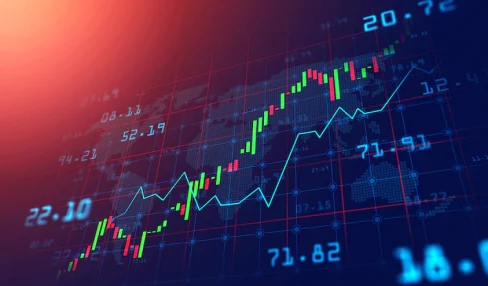Decentralized Finance (DeFi) And Decentralized Exchanges (DEXs): The Ultimate Guide
4 Mins Read
Published on: 06 March 2023
Last Updated on: 13 November 2024

toc impalement
Decentralized Finance (DeFi) has emerged as one of the most promising applications of blockchain technology.
It is a new paradigm for financial services that seeks to provide an open, transparent, and trustless alternative to traditional financial systems. In this article, we will explore the concept of DeFi and its key components, including Decentralized Exchanges (DEXs).
What Is Decentralized Finance (DeFi)?

Decentralized Finance (DeFi) refers to a new generation of financial services that are built on the basis of decentralized blockchain networks.
It aims to provide an open, transparent, and accessible alternative to traditional financial systems that are often opaque, expensive, and exclusionary. Visit Immediate Edge and download the app for a new crypto investing strategy.
DeFi applications are based on blockchain technology, which provides a decentralized and trustless platform for executing financial transactions. The use of smart contracts, which are self-executing programs that run on the blockchain, enables the automation of financial processes and reduces the need for intermediaries.
DeFi offers a wide range of financial services, including lending and borrowing, trading, insurance, and asset management. It is built on open protocols that are accessible to anyone with an internet connection and a compatible wallet.
Decentralized Exchanges (DEXs)

Decentralized finance Exchanges (DEXs) are a key component of the DeFi ecosystem. They provide a decentralized platform for trading cryptocurrencies without the need for a centralized intermediary.
Traditional centralized exchanges are vulnerable to hacks and other security breaches, and they also require users to trust the exchange operator to hold their assets securely. Decentralized exchanges, on the other hand, are based on blockchain technology, which provides a secure and transparent platform for executing trades.
The decentralized finance companies and exchanges are typically based on the Ethereum blockchain and use smart contracts to execute trades. They offer several advantages over centralized exchanges, including improved security, transparency, and accessibility.
Advantages Of DEXs
Improved Security: Decentralized finance companies are more secure than centralized exchanges because they are based on blockchain technology, which provides a secure and transparent platform for executing trades. The use of smart contracts also reduces the risk of hacks and other security breaches.
Transparency: The decentralized finance exchanges are transparent because all transactions are recorded on the blockchain and can be viewed by anyone. This provides users with a high degree of transparency and accountability.
Accessibility: Decentralized exchanges are accessible to anyone with an internet connection and a compatible wallet. There are no restrictions on who can use a decentralized exchange, which makes it an ideal platform for trading cryptocurrencies.
Disadvantages Of DEXs
Liquidity: One of the main disadvantages of decentralized finance exchanges is their relatively low liquidity compared to centralized exchanges. This can make it difficult for traders to execute large trades without affecting the price.
User Interface: Decentralized exchanges can be difficult to use for users who are not familiar with blockchain technology. The user interface can be complex, and it can take some time to get used to.
Transaction Fees: Decentralized exchanges typically charge higher transaction fees than centralized exchanges. This is because the use of smart contracts requires more computational power and resources.
Popular DEXs
Uniswap: Uniswap is one of the most popular decentralized finance exchanges. It is based on the Ethereum blockchain and uses an automated market maker (AMM) system to provide liquidity for trades.
SushiSwap: SushiSwap is a fork of Uniswap that offers additional features and incentives for liquidity providers.
Balancer: Balancer is a decentralized exchange that uses a pool-based system to provide liquidity for trades. It also offers advanced trading features such as limit orders and stop losses.
Future Perspectives Of Decentralized Finance

Decentralized Finance (DeFi) and Decentralized Exchanges (DEXs) have emerged as the future of financial services. DeFi offers an open, transparent, and accessible alternative to traditional financial systems, and DEXs provide a secure and decentralized platform for trading cryptocurrencies.
Although DeFi and DEXs are still in their early stages of development, they have the potential to transform the financial services industry. The use of blockchain technology and smart contracts enables the automation of financial processes and reduces the need for intermediaries. This results in a more efficient, transparent, and accessible financial system that benefits everyone.
However, as with any new technology, there are still challenges that need to be addressed. For example, decentralized exchanges currently have lower liquidity than centralized exchanges, which can make it difficult for traders to execute large trades without affecting the price. The user interface of DEXs can also be complex, which can be a barrier to adoption for users who are not familiar with blockchain technology.
Despite these challenges, the growth of DeFi and DEXs has been remarkable. In 2021, the total value locked in DeFi protocols exceeded $100 billion, up from just $1 billion in 2019. This demonstrates the rapid pace of innovation and adoption in the DeFi ecosystem.
As more users and developers enter the DeFi space, we can expect to see further innovation and growth in the coming years. This will lead to a more diverse and robust financial system that is accessible to everyone, regardless of location or background.
Bottomline:
Decentralized Finance (DeFi) and Decentralized Exchanges (DEXs) are the future of financial services. They offer a more efficient, transparent, and accessible alternative to traditional financial systems, and they have the potential to transform the financial services industry.
Although there are still challenges that need to be addressed, the rapid growth of DeFi and DEXs demonstrates the potential of this new paradigm for financial services.
Read Also:


















Comments Are Closed For This Article